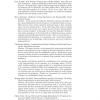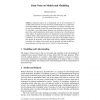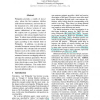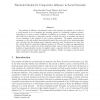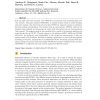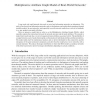158
click to vote
CORR
2009
Springer
15 years 1 days ago
2009
Springer
Abstract. We apply Uppaal Tiga to automatically compute adaptive scheduling strategies for an industrial case study dealing with a state-of-the-art image processing pipeline of a p...
137
click to vote
BIRTHDAY
2009
Springer
15 years 1 days ago
2009
Springer
Analytical models are a fundamental tool in the development of computer-based systems of every kind: their essential purpose is to support human understanding and reasoning in deve...
129
Voted
ACL
2009
15 years 2 days ago
2009
This paper presents a model for summarizing multiple untranscribed spoken documents. Without assuming the availability of transcripts, the model modifies a recently proposed unsup...
119
click to vote
ACL
2009
15 years 2 days ago
2009
We present a novel approach to deciding whether two sentences hold a paraphrase relationship. We employ a generative model that generates a paraphrase of a given sentence, and we ...
122
click to vote
ACL
2009
15 years 2 days ago
2009
In this paper, we propose a new Bayesian model for fully unsupervised word segmentation and an efficient blocked Gibbs sampler combined with dynamic programming for inference. Our...
106
click to vote
ACL
2009
15 years 2 days ago
2009
Wikipedia provides a wealth of knowledge, where the first sentence, infobox (and relevant sentences), and even the entire document of a wiki article could be considered as diverse...
116
click to vote
ACL
2009
15 years 2 days ago
2009
We investigate the task of unsupervised constituency parsing from bilingual parallel corpora. Our goal is to use bilingual cues to learn improved parsing models for each language ...
167
click to vote
WINE
2010
Springer
15 years 2 days ago
2010
Springer
The problem of influence maximization deals with choosing the optimal set of nodes in a social network so as to maximize the resulting spread of a technology (opinion, productowne...
123
click to vote
WCET
2010
15 years 2 days ago
2010
Safe and tight worst-case execution times (WCETs) are important when scheduling hard realtime systems. This paper presents METAMOC, a modular method, based on model checking and s...
164
click to vote
WAW
2010
Springer
15 years 2 days ago
2010
Springer
Large scale real-world network data such as social and information networks are ubiquitous. The study of such social and information networks seeks to find patterns and explain th...
